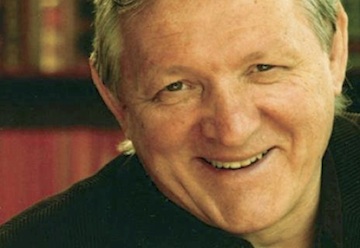
“If I could communicate well, I could fight with words
rather than with my fists.”
—James Ragan
By Melissa Immel
When James Ragan was young, he frequently found himself engaged in fistfights with his peers. As he grew older, he said he “began to respect language,” and discovered that the power of his words was infinitely greater than the impact of his fists.
Now an internationally recognized poet, Ragan has read his poetry for six different heads of state and upwards of twenty ambassadors, in venues including Carnegie Hall and the United Nations. He is also a screenwriter, a playwright, a film director, an actor, and a professor.
Ragan earned his BA at St. Vincent College in 1966 and his PhD at Ohio University in 1971. He became an honorary Phi Beta Kappa member in 2002 at the University of Southern California, where he was a faculty member for two and a half decades.
His work includes, but is certainly not limited to, poetry books such as Yevgeny Yevtushenko: Collected Poetry, 1952-1990 (1990), The Hunger Wall (1995), In The Talking Hours (2004), and Too Long a Solitude (2009).
Ragan’s poetry has caused great controversy over the years. Much of his work was banned in the Czech Republic under Communist rule. When he visited his Czechoslovakian family, he had to report to police stations everywhere he went, since he was writing against the Communist regime. When one of his cousins put his book of poetry on a public library shelf, government officials cut out the poems that they deemed offensive.
Ragan continued to use his poetry as a fighting tool. He was in the Czech Republic during the Velvet Revolution and has written about it in his work. As a young adult in the United States in the 1960s, Ragan and his peers protested for women’s rights, civil rights, and against the Vietnam War. According to Ragan, they believed that they were “there to prick the conscience of a society.” By eliminating cynicism and being proactive, Ragan said, “You can produce the better world.”
Throughout his career, Ragan has served as a Fulbright professor in Yugoslavia, China, and the Czech Republic. He directed the University of Southern California Master of Professional Writing program for 25 years. Ragan has served as a distinguished professor at Charles University in Prague for over 20 years, and continues to teach summer courses there every year.
Ragan aims to teach his students to write not to win tenure in academia, but to change society and culture. He argues that great writers care about others and about the world rather than about themselves.
In the Czech Republic, a documentary about Ragan’s career, titled Flowers and Roots, was produced by Arina Films and released in 2013. Ragan was taken by surprise by this honor, and hopes that the documentary will be picked up in the United States in the near future.
Looking ahead, Ragan says he has more books and films planned. He hopes to write until he is 90 years old and beyond, and to never stop traveling the world.
Ragan’s career is a clear reflection of Phi Beta Kappa’s value of outstanding achievement in the arts and sciences. Beyond academic success, Ragan believes in the importance of using the power of poetry to “comfort the afflicted and afflict the comfortable.” “It is up to people like us,” Ragan said, referring to artists and those in power, “to go beyond our borders – to cross them and break them down.”
Ragan wants newly elected members of Phi Beta Kappa to understand that “yes” is the most powerful word in their vocabulary. He advises to “walk through the doors when they open.” Ultimately, as Ragan has striven to do throughout his years, he hopes that young Phi Beta Kappa members will “chase the truth and live a life of passion.”
Melissa Immel is a graduating senior at University of California, Santa Barbara majoring in political science. UCSB is home to the Lambda of California Chapter of Phi Beta Kappa.




